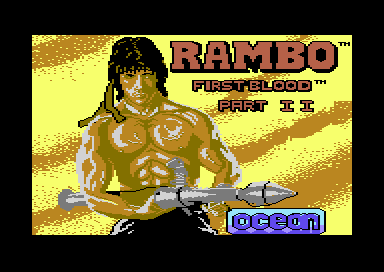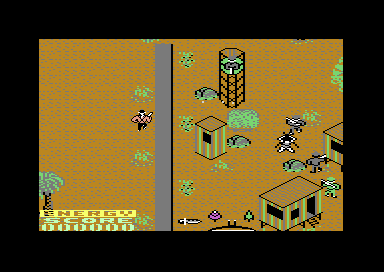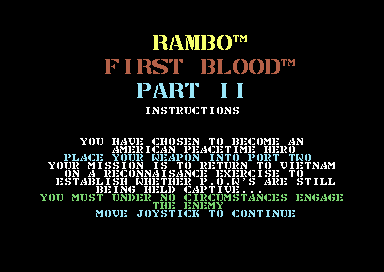Rambo: First Blood Part II (Ocean, 1986)
The first C64 game I ever played?
15 Sep 2021 | by njmcode | 8 min
- Genre:
- Action | Shoot-em-up
- Format:
- Cassette
- Developer:
- Ocean
- Composer:
- Martin Galway
- Publisher:
- Ocean
- Released:
- 1986
- Tags:
- movie-tie-in | single-player
Memory
This might have been my first encounter with a C64 game.
I say 'might' because, as with most of my musings down at The Raster Bar, we're going back over three decades here. As vivid as some of the individual memories are, the context and exact timings are often muddled and blurred. Still, this remains my earliest memory of Commodore's machine, and definitely pre-dates my family's purchase of one, likely being another factor in my desire to have my own.
My neighbour had moved away from our street a few months prior. He was a close friend, and going to his newer, bigger house in an unfamiliar part of town was an emotionally-complex experience my young self wasn't equipped to understand at the time. We sat on the floor of a cavernous-yet-unfurnished room in the house, his new C64C connected to a black-and-white TV. I didn't know much about the machine, but I knew that I loved computers and computer games, despite only having an Atari 2600 back home.[1] And Rambo: First Blood Part II was the game we played that day.

The game was a top-down, multi-directional action game based on the Sylvester Stallone movie of the same name. As Rambo, you were tasked with assaulting a Vietnamese prison camp where American POWs were supposedly being held. You were armed with throwing knives and a bow with regular and explosive arrowheads, and could locate other weapons in the field. Enemy soldiers fired upon Rambo perpetually, and the jungle itself could be destroyed in order to advance. Rambo could choose to rescue a lone POW in the camp, and an attack helicopter lay to the North for his use if he could make it that far.
I certainly wasn't a game-playing prodigy at such an early age, and my sessions with Rambo were appropriately short. I only skimmed the manual, as kids are wont to do, but my friend warned me that rescuing the POW was required in order to advance. Still, my lack of skill meant that I never made it to the chopper, and our playdate ended with me wondering what lay beyond the parts of the game I'd seen.
Some time later, I had just acquired my own C64, and my parents were also preparing for us to move. In a nice stroke of symmetry, the seller of our new house gifted me a bunch of C64 tapes they had lying around, among which was Ocean's Hollywood Collection featuring Miami Vice, The Great Escape, Top Gun and the still-remembered Rambo. I was at last able to appreciate the game on my own time, and in glorious colour now too.
The first thing I noticed this time around was the loading music: a curious Morse code-esque intro that gave way to a sizzling, powerful tune that perfectly suited the muscular graphical image of Rambo himself, posing before a wall of fire with a rocket launcher in hand.[2] The sonic pyrotechnics continued right through the experience, from the menacing drones of the title screen to the echoing, evolving dramatics of the in-game music, and many other incidental jingles. As far as gameplay goes, I was still lacking a manual for the game, so fumbled my way through it based on memory. I went straight for the chopper this time, eager to see what was next, but was met with a strange, downbeat 'task complete' screen, ending the game early. Clearly, rescuing the first POW was the true path to success, and sure enough, getting him to the chopper effectively unlocks the latter half of the game.

Once in the chopper, it's a quick fly back to the camp to free the rest of the POWs, then a desperate escape to the north against ever-dwindling energy supplies and a pursuing enemy gunship. This section proved quite frustrating, and though the gunship's presence was initially intimidating, it soon gave way to resentment at having to start over once more. In time, I prevailed, landing on a friendly helipad and receiving an incongruously-jovial victory march as reward, alongside the standard 'well done' message of the day.
Rambo: First Blood Part II would see occasional reloads from me in the coming years, nearly always due to the incredible music it offered. I don't recall actually playing it very often after completing it - the entire thing could be done end-to-end in about 10 minutes once the optimum route was known, with no difficulty levels or extended gameplay options to lengthen the experience. Still, I considered it worth booting up for the loading music alone.
Analysis
The Rambo movies form part of a personal cinematic category: those I watched after playing their respective tie-in games. By my early teens, my parents had introduced me to the (then-)trilogy through occasional VHS gifts, but completely out of sequence: I watched Rambo III first, then 1980's First Blood, before finally watching Part II. The broad strokes of the movie plot were known to me from the game, but I was otherwise ignorant of the political context in which the story played out. It quickly became one of my favourite movies, partly due to its bombastic action, rich atmosphere, jingoistic heroics and general Stallone badassery, but mostly thanks to how it recontextualised the C64 game for me.[3]
My first watch of it was quite the experience. It was like seeing the greatest remaster of an 8-bit game imaginable at the time. Jerry Goldsmith's superb score, unmistakeably the full orchestral counterpart to Martin Galway's in-game tune, played over the opening credit sequence. To hear such a beloved SID tune rendered with the full sonic palette of the cinematic composer was genuinely profound.[4] Other incidental jingles from the game were also immediately recognisable: the 'Task One Complete' tune made a brief appearance over a pensive riverboat scene; the sinister rumblings of the enemy gunship theme were obviously very similar between the two mediums. Galway's iconic loading music is an original composition, but even then was so sonically and harmonically well-suited to the movie's score that I can imagine a Goldsmith-style arrangement of it even today.
The movie's plot, meanwhile, helped me understand some of the gameplay choices made for the C64 version. Rambo's assigned mission is explicitly one of reconnisance: get in, find evidence of POWs, and get out. His superiors, in a line echoed by the game's title screen crawl, directly order him to not 'engage the enemy'. In the film, of course, Rambo disobeys this order and rescues a lone POW from the camp, setting off a chain of bureaucratic betrayals and portraying Rambo's subsequent heroics as the ultimate cleansing of national embarrassment and anguish.[5] The game does away with the 'Rambo is captured' arc, but both keeps the observation-only stipulation and distinctly positions it as the wrong choice to make, ending the game early if you don't rescue the first POW before reaching the chopper. It's a surprisingly subtle addition to what looks on the surface like another Commando clone, and veers way closer to both player agency and fidelity to the source material than many other movie tie-in games on the C64.

As a child, I wondered why Rambo used knives and a bow in the game, but this is again faithful to the movie: Rambo loses most of his gear when deploying to the jungle, and has to fall back on his basic weapons and old Vietnam survival skills to complete the mission. The thrilling gunship pursuit of the movie's final act let me regard the game's final moments more fondly, despite the frustration they presented. Even the game's graphics do a decent job of approximating the movie's locations, from temple statues and murky rivers to the watchtowers and prison cells of the POW camp. As a fan of the movie, I still feel a real sense of love and respect from the game, like its makers really took the time to nail as many details as they could within the limitations of the C64.
That said, there are many prominent parts of the movie that didn't make it to the game. Despite its action backbone and its character's modern-day reputation, the film is by no means a slaughterfest until its third act. The first half of the movie is defined largely by survival, stealth and escape, with occasional explosive moments. Comparing the tension of Rambo's first visit to the camp, avoiding guards and searchlights under cover of night, with the near-immediate shootouts of the C64 version, is perhaps unfair - the machine could only achieve so much in 1986, and stealth mechanics in action games were not a well-realised concept at the time.[6] That aside, even some of the movie's action set-pieces would have helped break up the gameplay: the riverboat ambush, the mortar attack, the escape from overhead searchlights, the fight aboard the chopper, and others. To realise these scenes in-game, though, would have required a multi-stage, minigame-orientated approach akin to Cosmi's Navy SEAL, or later movie tie-ins like Batman: The Movie, The Untouchables and Platoon, undoubtedly forcing the game to be a multi-load affair. As it was, Ocean focused on an enjoyable action game with some element of player choice, delivered in a single load with easy replayability, and I respect that approach.
Rambo himself would get many, many more outings in digital form over the years across multiple platforms and generations. The character's endurance in pop culture is both impressive and, in a modern context, increasingly troubling. Much discourse has surrounded the key changes between David Morell's original concept and Stallone's interpretation, and the mutation of the character's idelogical framing from post-Vietnam indictment to right-wing revenge fantasy, but I digress: we've had new Rambo movies and games in the past two decades, of arguably diminishing quality. Part II's immediate sequel, the confusingly-titled Rambo III, was released in 1988 and saw a C64 tie-in. In an echo of my experience watching the movies, I had already played at least part of III's game before I properly got my hands on my own copy of Part II.
Martin Galway's loading theme remains the enduring legacy of Rambo: First Blood Part II among the C64 community, having been remixed, re-appraised and cited many times times. It's a pattern that became quite familiar to C64 owners: 'crap/decent game, great music'. Not that Rambo is a bad game, just a fleeting one - its distinctive quirks and respect for its origins ultimately neutered by its basic gameplay and shockingly-brief length.
njmcode